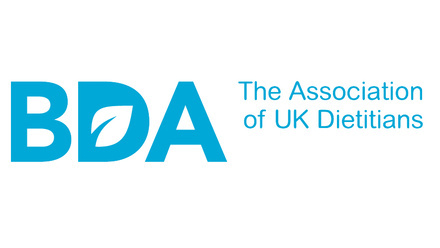Pregnancy and pre-pregnancy are both good times to think about healthy eating. What you eat now will help your baby to grow and develop healthily, giving them the best start in life. It will also be good for your health. This fact sheet is intended to support those considering pregnancy and those already pregnant with making healthy lifestyle choices.
Healthy eating during pregnancy
This does not mean going on a special diet; simply follow general healthy eating guidelines, found in the BDA Healthy Eating food fact sheet.
Eat regularly – three meals a day (and two to three snacks if needed). Don’t leave it longer than 12 hours between eating. If you don’t usually eat breakfast, start with a small snack in the morning.
Base meals on a variety of food groups (see BDA food fact sheet on portion sizes for more information). If you need extra energy, increase portions of protein and/or wholegrain carbohydrates.
Fluids (water, fruit teas, skimmed or semi-skimmed milk, fruit juice) are important to keep you hydrated. Nausea is worse when dehydrated.
- Have about 1900ml a day (about eight glasses)
- Drink more if you’re being sick, the weather is hot or if exercising
Ensure good food hygiene practices
Foods to avoid or be careful with due to their possible risks to your baby:
|
Risk |
Avoid |
Take care |
|
Salmonella |
Raw shellfish Raw and undercooked meats Unpasteurised milk Raw or undercooked eggs without the Lion Code |
Always wash hands after handling raw meats, store raw foods separately from cooked foods to prevent cross-contamination. Processed ice-cream made with pasteurised milk and eggs (i.e. from the supermarket) should be safe. UK eggs with the Lion Code can be served raw or lightly cooked. |
|
Listeria |
Soft ripened cheeses including Brie, Camembert and some goat’s cheeses Blue veined cheeses e.g. Danish Blue All unpasteurised dairy products All types of pâte Soft serve ice cream from vans or kiosks |
Ensure takeaway and cooked-chill ready meals are heated thoroughly and piping hot. Due to a listeria outbreak linked to smoked fish you should only eat smoked fish products that have been thoroughly cooked. Make sure they are steaming hot all the way through. |
|
Contaminants eg mercury, dioxins |
Shark Marlin Swordfish |
Limit tuna to four medium cans per week or two steaks. Eat oily fish, e.g. salmon, mackerel, sardines, no more than twice per week. |
|
Vitamin A |
Multivitamin supplements containing excess retinol form of vitamin A Fish liver oils containing more than 700mcg/day Liver and liver products e.g. pate, faggots |
|
|
Caffeine |
Foods labelled high caffeine content |
Have no more than 200mg caffeine daily. No more than two mugs of instant coffee (one mug of filter coffee) or three cups of tea a day. Or choose decaffeinated. Other foods containing caffeine include cola, high energy drinks and chocolate. |
Chilled food should be stored at the correct temperature (below 5°C). Foods should not be eaten after the ‘use by’ date. Wash soil from fruit, vegetables and salad.
Alcohol in pregnancy
UK guidelines recommend that for those planning pregnancy and those who are pregnant, the safest option is to avoid alcohol. Alcohol can increase the risk of miscarriage or your baby could develop a group of problems known as Foetal Alcohol Spectrum Disorder which include poor growth and learning and behavioural difficulties. If you have any concerns about alcohol consumption in pregnancy, speak to your midwife.
Smoking
You or your partner should not smoke during or prior to pregnancy. Smoking can harm your unborn baby by causing premature birth, low birth weight and other long-term health problems.
Physical activity
If you are pregnant, you should aim for at least 30 minutes of moderate intensity activity per day. If you have not been exercising, begin with no more than 15 minutes, three times per week - then increase gradually to 30 minutes. Those who regularly exercise before pregnancy are safe to continue.
Top tips
- Eating a varied diet including foods from the main food groups.
- Include good sources of iron and calcium every day.
- Have regular meals, e.g. breakfast, lunch & dinner (helps to reduce nausea).
- Take a daily supplement of 400mcg folic acid and 10mcg vitamin D.
- Those with more restrictive diets, e.g. vegans may benefit from other supplements (see our Plant-based diet Food Fact Sheet.)
- If you opt for plant milks (as an alternative to cow’s milk), choose one that is fortified with calcium and iodine.
- Avoid alcohol, smoking and certain foods (listed in the table above).
- Exercise regularly.
- If you need further support if you are under (BMI<18.5kg/m2) or over weight (BMI>25 kg/m2) or having a multiple pregnancy - ask to be referred to a dietitian.
Frequently asked nutrition questions
Do I need to be eating for two?
No. The amount you need to eat will depend on your Body Mass Index (BMI) at the start of your pregnancy (use this BMI calculator to find out your BMI). If you are of healthy BMI, an average adult needs around 1900kcal per day prior to pregnancy, your energy needs will increase by 200 kcal only in the third trimester.
How do I know that I am meeting my nutritional needs?
By concentrating on a healthy varied diet and staying active your body should naturally gain sufficient weight for your baby to be born at optimum birth weight. This is important for them to continue to grow and develop well.
Currently there are no UK guidelines on appropriate weight gain during pregnancy. However, if you or your clinician are concerned and need a guide, the following table from the US Institute of Medicine (IOM) can be used as a guide. Maintain a weight gain graph for review to monitor progress in weight gain only if your clinician thinks it would improve your outcomes. If you are concerned about your weight, ask for a referral to a maternal dietitian.
|
BMI at the start of pregnancy |
Guide to weight gain during pregnancy |
Average weekly weight gain rate in second and third trimesters** |
|
Less than 18.5 |
12.5-18kg |
0.5kg/week (1.0 lbs/week) |
|
18.5-24.9 |
11.5-16kg |
0.4 kg/week (1.0 lbs/week) |
|
25-29.9 |
7-11.5kg |
0.3 kg/week (0.6 lbs/week) |
|
30 and over* |
5-9kg |
0.2 kg/week (0.5 lbs/week) |
* If your BMI is 35 or over, you and your healthcare team may aim for lower than 5kg weight gain to reduce adverse risks to you and your baby.
** This is assuming weight gain of 0.5-2 kg in the first trimester.
When do I need to consider higher energy intake?
If you are underweight or you continue to be very physically active throughout pregnancy, your energy requirements will need to increase to meet your needs for pregnancy, development of the foetus and creating reserves for lactation. The amount of energy increase would need to be individually assessed, if you are not gaining enough weight discuss with your midwife/GP or ask for a referral to a dietitian.
Should I be worried about weight gain during pregnancy?
Weight loss is strictly not recommended during pregnancy as it can be harmful to the health of the growing baby. If you have a high BMI or are reducing your physical activity during pregnancy, your energy requirements may not change (see table above for a guide to weight gain and pregnancy). A dietitian would be able to guide you on avoiding excessive weight gain while ensuring you are eating well.
Should I take additional nutritional supplements?
Yes. There are two vitamin supplements needed during pregnancy: folic acid and vitamin D. Those who follow a vegetarian/plant-based diet may need to take additional supplementation of iodine, omega-3 fatty acids and vitamin B 12 (see the BDA plant-based diet sheet).
Folic Acid: This vitamin can help reduce the risk of your baby developing neural tube defects (NTDs). Take a supplement with 400 micrograms (mcg) of folic acid every day from pregnancy planning (as soon as you stop contraception) until week 12 of your pregnancy. If you are at an increased risk of having a baby with NTD, you may need to take more.
Some people take a higher dose of folic acid. Why?
You will need more folic acid (five milligrams (mg) a day) if your risk of having a baby with NTD is higher than normal. If you are at an increased risk, your doctor will need to prescribe the higher dose. You may be advised to take an increased dose if: you have had a previous pregnancy affected by NTD, you or your partner have NTD, you are taking certain medications for epilepsy, you have coeliac disease or diabetes, your BMI is 30 or more, you have sickle-cell anaemia or thalassaemia. Speak to your doctor if you think you may need a higher dose.
Also include folate rich food in your diet (green vegetables, fortified bread and cereals).
Vitamin D: Vitamin D helps to absorb calcium and is important for bone health; too little could cause rickets in your baby. Take a supplement of ten micrograms (mcg) of vitamin D every day throughout your pregnancy and when breastfeeding. Higher doses (25mcg) of vitamin D are likely needed for groups at increased risk (with increased skin pigmentation, reduced exposure to sunlight, or those who are socially excluded or living with obesity), but further evidence is needed to support this.
Iodine: If you are planning pregnancy, are pregnant or lactating have a higher requirement of iodine which can effectively be met with food sources such as fish, milk and dairy products. If you are vegan or have a compromised nutritional intake, it is recommended to take a supplement of 150 mcg daily. Those with pre-existing thyroid conditions need to discuss iodine requirements with their GP or maternal dietitian.
Multivitamin: If you are taking a prenatal multivitamin, ensure that you only take the recommended dose as high levels of certain vitamins and minerals can be toxic to you and your baby. Do not take vitamin supplements that have vitamin A (retinol) in when you are pregnant as high levels can cause harm to your baby.
How to manage possible side effects during pregnancy
-
Constipation - Eat wholemeal bread, high-fibre breakfast cereal, fruit and vegetables, drink plenty of water daily and regular physical activity.
-
Feeling sick - Eating and drinking little and often can help. Prevent dehydration by drinking little and often. Ginger-rich foods/drinks, dry crackers and acupressure may be helpful. In 90 per cent of pregnancies, sickness resolves by 20 weeks. If your vomiting is very severe and you are unable to keep food/water down leading to dehydration, get medical advice promptly.
- Heartburn/indigestion - Try eating smaller regular meals and snacks. Reduce caffeine and fatty, fried and spicy foods.
Source(s)
Abayomi JC, Charnley MS, Weeks A, Wilding JPH. An observation of gestational weight gain in obese pregnancies [Internet]. Vol. 74, Proceedings of the Nutrition Society. 2015. Available from: http://dx.doi.org/10.1017/s0029665115002979
Advisory committee on the microbiological safety of food. Ad Hoc Group on Eggs An update on the microbiological risk from shell eggs and their products. 2016. Available from: https://acmsf.food.gov.uk/sites/default/files/acmsf-egg-reportv1.pdf
Bath SC, Hill S, Infante HG, Elghul S, Nezianya CJ, and Rayman MP. Iodine concentration of milk-alternative drinks available in the UK in comparison to cows’ milk. Br J Nutr. 2017 Oct; 118(7): 525–532. Abstract available from: https://www.ncbi.nlm.nih.gov/pmc/articles/PMC5650045/
Bath SC, Steer CD, Golding J, Emmett P, Rayman MP. Effect of inadequate iodine status in UK pregnant women on cognitive outcomes in their children: results from the Avon Longitudinal Study of Parents and Children (ALSPAC). Lancet. 2013 Jul 27;382(9889):331–7.
Bodnar LM, Catov JM, Roberts JM, Simhan HN. Prepregnancy Obesity Predicts Poor Vitamin D Status in Mothers and Their Neonates [Internet]. Vol. 137, The Journal of Nutrition. 2007. p. 2437–42. Available from: http://dx.doi.org/10.1093/jn/137.11.2437
Cao Y, Lu J and Lu J. Paternal Smoking Before Conception and During Pregnancy Is Associated With an Increased Risk of Childhood Acute Lymphoblastic Leukemia: A Systematic Review and Meta-Analysis of 17 Case-Control Studies. J Pediatr Hematol Oncol, 42 (1), 32-40 Jan 2020. Abstract available from: https://www.ncbi.nlm.nih.gov/pubmed/31743318
CARE Study Group. Maternal caffeine intake during pregnancy and risk of fetal growth restriction. A Large prospective observational study. British Medical Journal 2008 337: a2332
CMACE/RCOG Joint Guideline https://www.rcog.org.uk/globalassets/documents/guidelines/cmacercogjointguidelinemanag ementwomenobesitypregnancya.pdf
Comish J. clinical report 2019 key messages and infographics [Internet]. [cited 12 Mar 2021]. Available from: https://maternityaudit.org.uk/pages/cr2019km
Dawson-Hughes B, Heaney RP, Holick MF, Lips P, Meunier PJ, Vieth R. Estimates of optimal vitamin D status [Internet]. Vol. 16, Osteoporosis International. 2005. p. 713–6. Available from: http://dx.doi.org/10.1007/s00198-005-1867-7
Department of Health. UK Chief Medical Officers’ Low Risk Drinking Guidelines. 2016. Available from: https://assets.publishing.service.gov.uk/government/uploads/system/uploads/attachment_data/file/545937/UK_CMOs__report.pdf
Dietitians of Canada. Pregnancy. In: Practice-based Evidence in Nutrition® [PEN].09 Nov 2019 [cited 09 Nov 2019]. Available from: http://www.pennutrition.com. Access only by subscription. Click Sign Up on PEN login page.
Food Standards Agency. Food Additives. 2018. Available from: https://www.food.gov.uk/safety-hygiene/food-additives#caffeine-in-energy-drinks-and-other-foods
Goldstein RF, Abell SK, Ranasinha S, Misso M, Boyle JA, Black MH, et al. Association of Gestational Weight Gain With Maternal and Infant Outcomes: A Systematic Review and Meta-analysis. JAMA. 2017 Jun 6;317(21):2207–25.
Hollis BW. Vitamin D Requirement During Pregnancy and Lactation [Internet]. Vol. 22, Journal of Bone and Mineral Research. 2007. p. V39–44. Available from: http://dx.doi.org/10.1359/jbmr.07s215
Huang HY, Chen HL, Feng LP. Maternal obesity and the risk of neural tube defects in offspring: A meta-analysis. Obes Res Clin Pract [Internet]. 2017 [cited 2021 Mar 12];11(2). Available from: https://pubmed.ncbi.nlm.nih.gov/27155922/
Hyppönen E, Power C. Hypovitaminosis D in British adults at age 45 y: nationwide cohort study of dietary and lifestyle predictors [Internet]. Vol. 85, The American Journal of Clinical Nutrition. 2007. p. 860–8. Available from: http://dx.doi.org/10.1093/ajcn/85.3.860
NHS. Foods to avoid in pregnancy. 2020. Available from: https://www.nhs.uk/pregnancy/keeping-well/foods-to-avoid/
NICE. Maternal and child nutrition. 2014. Available from: https://www.nice.org.uk/guidance/ph11
NICE. Weight management before, during and after pregnancy. 2010. Available from: https://www.nice.org.uk/guidance/ph27/chapter/1-Recommendations#recommendation-2-pregnant-women
Raghad M Alhomaid, Maria S Mulhern, Jj Strain, Eamon Laird, Martin Healy, Michael J Parker, Mary T McCann, Maternal obesity and baseline vitamin D insufficiency alter the response to vitamin D supplementation: a double-blind, randomized trial in pregnant women, The American Journal of Clinical Nutrition, Volume 114, Issue 3, September 2021, Pages 1208–1218, https://doi.org/10.1093/ajcn/nqab112
Rasmussen KM, Catalano PM, Yaktine AL. New guidelines for weight gain during pregnancy: what obstetrician/gynecologists should know. Curr Opin Obstet Gynecol. 2009 Dec;21(6):521-6. Abstract available from: https://www.ncbi.nlm.nih.gov/pubmed/19809317
Royal College of Obstetricians & Gynaecologists. The management of nausea and vomiting of pregnancy and hyperemesis gravidarum. RCOG Green-top Guideline No. 69. Jun 2016. Available from: https://www.rcog.org.uk/globalassets/documents/guidelines/green-top-guidelines/gtg69-hyperemesis.pdf
Scientific Advisory Committee on Nutrition (SACN). Health matters: reproductive health and pregnancy planning. 2018. Available from: https://www.gov.uk/government/publications/health-matters-reproductive-health-and-pregnancy-planning/health-matters-reproductive-health-and-pregnancy-planning
Scientific Advisory Committee on Nutrition. Vitamin D and health. 2016. Available from: https://assets.publishing.service.gov.uk/government/uploads/system/uploads/attachment_data/file/537616/SACN_Vitamin_D_and_Health_report.pdf
Viljoen E, Visser J, Koen N, Musekiwa A. A systematic review and meta-analysis of the effect and safety of ginger in the treatment of pregnancy-associated nausea and vomiting. Nutr J. 2014 Mar 19;13:20. doi: 10.1186/1475-2891-13-20. Abstract available from: https://www.ncbi.nlm.nih.gov/pubmed/24642205
World Health Organization, Food and Agriculture Organization of the United Nations, United Nations University. Human energy requirements Report of a Joint FAO/WHO/UNU Expert Consultation. 2001. Available from: http://www.fao.org/3/y5686e/y5686e00.htm
Yu CKH, Sykes L, Sethi M, Teoh TG, Robinson S. Vitamin D deficiency and supplementation during pregnancy [Internet]. Vol. 70, Clinical Endocrinology. 2009. p. 685–90. Available from: http://dx.doi.org/10.1111/j.1365-2265.2008.03403.x






